|
|
|
Sort Order |
|
|
|
Items / Page
|
|
|
|
|
|
|
| Srl | Item |
| 1 |
ID:
022782
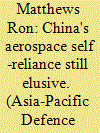

|
|
|
|
|
| Publication |
July-Aug 2002.
|
| Description |
36-38
|
|
|
|
|
|
|
|
|
|
|
|
|
|
|
|
| 2 |
ID:
151633


|
|
|
|
|
| Summary/Abstract |
This article explores the relationship between Chinese officials and Western European industrialists, revealing that in the second half of the 1950s, there already was a specific Western European interest in China's market potential, and that this was met with favour on the Chinese side. In order to become a strong and independent country, the People's Republic of China was especially interested in evaluating a wide range of offers in the chemical and energy sectors. By looking at the early achievements of the Italian company, National Hydrocarbon Holding (Ente Nazionale Idrocarburi, ENI), this article will show how its offer in terms of technology and engineering met with the favour of the Chinese at the beginning of the 1960s. This was just when the local petroleum industry was moving towards self-reliance, which China ultimately achieved, albeit for a short time. Sources show that, despite economic and political constraints, PRC decision-makers were perfectly aware of prices and commercial strategies, as well as of the state-of-the-art technology of the time. Furthermore, China's commercial cooperation with Western European companies in the 1950s–1960s meant that early on Chinese leaders had an opportunity to evaluate market alternatives to their tightly constraining alliance with the Socialist bloc.
|
|
|
|
|
|
|
|
|
|
|
|
|
|
|
|
| 3 |
ID:
189587


|
|
|
|
|
| Summary/Abstract |
Bonhomie between India and Japan is as old as the days of Subhash Chandra Bose when Japan helped the renowned freedom fighter Bose towards the consolidation of Azad Hind Fauj, which not only deterred the British colonial power of the day but also set the path for its downfall and the final exit. Since, then the bilateral relations have passed through number of phases but has never seen rough patches. Over the recent past, bilateral relations between India and Japan has been adding many new feathers to its cap. Owing to geopolitical shifts in its own vicinity and in the extended neighborhood as well.
|
|
|
|
|
|
|
|
|
|
|
|
|
|
|
|
| 4 |
ID:
187349
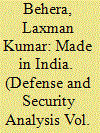

|
|
|
|
|
| Summary/Abstract |
With INR 107.45 billion ($1.54 billion) worth of arms exports and export authorisations in 2018–2019, India realised its biggest annual defence export ambition to date. Breaking into the world’s top 25 defence exporters for the first time, India has set its goal even higher, with a target of INR 300 billion ($5 billion) in defence exports by 2025. Can India achieve the goal and join the ranks of major arms exporting countries? What would it take for India to realise its defence export goal? And what has India done to achieve it? The paper examines India’s recent defence export performance and, in so doing, it probes various reform initiatives taken by the Indian government to promote international arms sales. The article argues that India has a significant domestic arms manufacturing capability, which, if harnessed properly, could propel the country as a significant player in the global arms bazaar.
|
|
|
|
|
|
|
|
|
|
|
|
|
|
|
|
| 5 |
ID:
170248
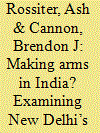

|
|
|
|
|
| Summary/Abstract |
When it comes to states arming themselves, it has become axiomatic among scholars of comparative defence industries that go-it-alone production is no longer an option for most. The processes associated with defence-industrial globalization combined with the ever-rising costs of producing leading-edge weapons systems present huge disincentives for autarky in armaments. Against these strong headwinds, however, India has recently launched, as part of a broader, multi-sector initiative called Make in India, a renewed effort to achieve greater self-reliance in armaments production. This article first places India’s recent defence indigenization efforts within wider discussions about states’ armament strategies and trends in global arms production. Secondly, it contextualizes the drivers behind New Delhi’s latest attempts to transform itself from leading arms importer to major producer (and significant exporter) against the backdrop of past efforts which have yielded little but disappointment. Third, it explicates the main facets of the current strategy for defence-industrial indigenization and gauges its chances for success. To preview the main findings, we argue that self-reliance in armaments via indigenous production will almost certainly continue to allude India because of systemic, structural and technological constraints.
|
|
|
|
|
|
|
|
|
|
|
|
|
|
|
|
| 6 |
ID:
066471


|
|
|
|
|
| Publication |
New York, M. E. Sharpe, 2005.
|
| Description |
xi, 322p.
|
| Standard Number |
0765616386
|
|
|
|
|
|
|
|
|
|
|
|
Copies: C:1/I:0,R:0,Q:0
Circulation
| Accession# | Call# | Current Location | Status | Policy | Location |
| 050306 | 320.95193/KIH 050306 | Main | On Shelf | General | |
|
|
|
|
| 7 |
ID:
179244
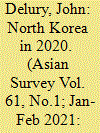

|
|
|
|
|
| Summary/Abstract |
North Korea slogged through 2020 in an effort to maintain public health and state power. Kim Jong Un’s hopes for an economic breakthrough were dashed by the COVID-19 outbreak in neighboring China, which posed an existential threat given the DPRK’s limited healthcare resources. Although swift sealing of borders helped prevent a crisis, keeping the country on national quarantine took a heavy toll. Information about internal developments was scarce this year, as demonstrated by the global media’s frenzied speculation in the spring that Kim Jong Un had died. Kim did scale down his public appearances, but convened frequent sessions of the ruling Politburo, often to complain about Party failings, and his sister Kim Yo Jong elevated her profile with tough messages for Seoul and Washington. North Korea remained inwardly focused to the end of the year, rebuffing South Korean entreaties at cooperation and ignoring the presidential election in the United States.
|
|
|
|
|
|
|
|
|
|
|
|
|
|
|
|
| 8 |
ID:
106323


|
|
|
|
|
| Publication |
2011.
|
| Summary/Abstract |
North Korea has a powerful national narrative which is based on struggle against external forces. Since the mid-nineties, this has been centered on sacrifice for the sake of military strength. Recently, however, this narrative arc has been shifted: Now the people are to be rewarded by the central government for years of sacrifice with improvement to quality of life. The 2009 currency reform, rather than simply a failure, was an integral part of the strategy to deliver this improvement by 2012. China's continued support for Pyongyang's plans to develop infrastructure and expand trade, combined with the national narrative, gives this development plan a reasonable chance to succeed.
|
|
|
|
|
|
|
|
|
|
|
|
|
|
|
|
| 9 |
ID:
145402


|
|
|
|
|
| Summary/Abstract |
North Korea's siege mentality is deeply rooted in negative experiences with out-groups in history. This worldview dominates its society and is the foundation of its mistrust toward the outside world. It has also become a crucial instrument for stable governance, social cohesion, and the regime's allocation of resources. However, in foreign affairs, negative or aggressive attitudes toward other nations are not beneficial for international cooperation and are more likely to intensify North Korea's isolation. Since a siege mentality is not an unchangeable disposition, its maintenance depends on deliberate reproduction by political, cultural, and educational mechanisms. The international community should assist North Korea to establish new ideas on threats, convey accurate information about out-groups, and reinterpret its views of the outside world.
|
|
|
|
|
|
|
|
|
|
|
|
|
|
|
|
| 10 |
ID:
163050
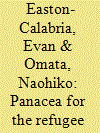

|
|
|
|
|
| Summary/Abstract |
This article provides a critical examination of the current extensive promotion of ‘self-reliance’ for refugees. The existing scholarship largely ignores the unsuccessful historical record of international assistance to foster refugees’ self-reliance and fails to discuss its problematic linkages to neoliberalism and the notion of ‘dependency’. The article reveals that the current conceptualisation and practice of self-reliance are largely shaped by the priorities of international donors that aim to create cost-effective exit strategies from long-term refugee populations. The authors argue that where uncritically interpreted and applied, the promotion of self-reliance can result in unintended and undesirable consequences for refugees’ well-being and protection.
|
|
|
|
|
|
|
|
|
|
|
|
|
|
|
|
| 11 |
ID:
141740
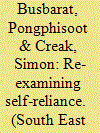

|
|
|
|
|
| Summary/Abstract |
Self-reliance sprang to prominence in Thailand in the 1980s in response to the socioeconomic upheavals of development, globalization and rural transformation. Whereas debates over self-reliance have tended to be polemical, with scholars critiquing its idealistic, nationalist and anti-market features, this article considers the divergent meanings of self-reliance. Redirecting attention from a collective idea of the 'self' based on motifs of the self-sufficient village and nation, to individual self-making, the authors argue that self-reliance can equally refer to an entrepreneurial ethic of maximizing one's potential under conditions of rapid rural transformation through active and pragmatic engagement with the market and the state. After introducing the collective and individual faces of self-reliance, the article presents a content analysis of Theknoloyi Chaoban (Villager Technology), a magazine founded in the late 1980s to promote self-reliance among farmers. As a repository of practical handbook knowledge, the magazine encourages village self-sufficiency and national self-sourcing alongside commercial and state-based strategies for boosting productivity, thus illuminating the complex realities of rural transformation and self-making in Thailand since the 1980s.
|
|
|
|
|
|
|
|
|
|
|
|
|
|
|
|
| 12 |
ID:
176389


|
|
|
| 13 |
ID:
058719


|
|
|
| 14 |
ID:
022749


|
|
|
|
|
| Publication |
Spring 2002.
|
| Description |
36-47
|
|
|
|
|
|
|
|
|
|
|
|
|
|
|
|
| 15 |
ID:
142622


|
|
|
|
|
| Summary/Abstract |
The article looks at Uzbekistan's political economy from the perspective of a logic of appropriateness, an approach that takes rules to be the underlying principle of action. The rules are mostly in line with a ‘spirit’ of self-reliance (mustaqillik), which has shaped Tashkent's international engagement since independence. From the perspective of those rules, the article reveals some important features of Russian–Uzbek relations, particularly the difficult and often tense negotiations over the future of the Tashkent Aviation Production Association (TAPOich). Self-reliance and the rules by which it was comprised were not, in the end, conducive to long-term cooperation with Russia in the aviation sector, where collaboration was first and foremost necessary.
|
|
|
|
|
|
|
|
|
|
|
|
|
|
|
|
| 16 |
ID:
153849
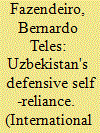

|
|
|
|
|
| Summary/Abstract |
President Islam Karimov's death provides an opportunity to gauge the origins and consequences of Uzbekistan's foreign policy. This article is aimed at contributing to that on-going conversation. To do so, it assesses the nature of Uzbekistani foreign policy, which the author categorizes as a type of defensive self-reliance, and to what extent the latter conditioned the government of Uzbekistan's international engagement. The author describes the main features of self-reliance and argues that the pursuit thereof led to five key trends: the relentless concern with international equality; a focus on bilateral relations; an aggressive defence of Uzbekistan's image; a drive for self-sufficiency; and a reluctance to embrace expansionist ideological agendas. To make his argument, the author begins by conceptualizing and distinguishing between ‘defensive’ and ‘offensive’ manifestations of self-reliance. He then traces the patterns of Uzbekistani self-reliance and concludes with a brief assessment of potential consequences were the foreign policy to change in the near future. The conclusion suggests that a shift from defensive to offensive self-reliance may constitute a problematic change to Uzbekistani foreign policy, but that relaxing any other of those trends may help open up the republic and the region of post-Soviet central Asia as a whole.
|
|
|
|
|
|
|
|
|
|
|
|
|
|
|
|
|
|
|
|
|